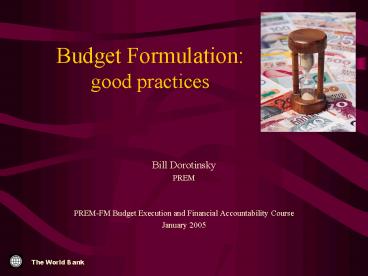Budget Formulation: good practices - PowerPoint PPT Presentation
1 / 14
Title:
Budget Formulation: good practices
Description:
Why budget formulation in a budget execution course? Other half of an ... Pulls together academic, audit, performance, evaluation of prior years financial ... – PowerPoint PPT presentation
Number of Views:77
Avg rating:3.0/5.0
Title: Budget Formulation: good practices
1
Budget Formulation good practices
- Bill Dorotinsky
- PREM
- PREM-FM Budget Execution and Financial
Accountability Course - January 2005
2
Outline
- Why formulation in an execution course?
- Three PEM System Objectives
- Process Issues
- Quality Issues
- Budget office roles
- New Resources
- References
3
Why budget formulation in a budget execution
course?
- Other half of an integrated system
- Problems emerging in execution may have origin in
formulation - You cannot implement well a badly formulated
budget - Some execution and formulation processes and
reforms interdependent - Cannot formulate well without actual expenditure
data as starting point - To properly diagnose and reform execution
requires some understanding of formulation
4
Three Objectives of Public Expenditure Management
Systems
- Macrofiscal discipline and stability
- Avoid public finance crises
- Support economic growth and stability
- Strategic allocation of resources
- Match government policy with programs, objectives
- Technical efficiency
- Getting the most from each dollar spent
5
Process Issues
- Due process
- Fair hearing for proposals, requests within
government - Coherence
- Budget process is planning process
- Planning within resource constraints
- Indicative ceilings for budget offered early in
the process - hard budget constraint
- Changing incentives
- Comprehensiveness
- Capital, all revenues and expenses
- Civil society participation
- decentralized impact analysis
- Legislative stage
- In executive via white papers
6
Process (continued)
- Proper decision sequence for coherent process
- Macrofiscal, revenues, expenditures
- Sectoral
- Administrative/program/project
- Accountability Link resources with management
responsibility - Schedule
- Budget calendar issued
- Sufficient time for sound proposals
- Ministries
- Budget office analysis
- Legislative review
- Two stage process
7
Quality Issues (improving process outcome)
- Multi-year perspective
- Setting multi-year policy objectives
- Conservative economic, revenue forecast
- Likely versus hoped for
- Benchmarked against non-governmental forecasts
- Realistic expenditure forecast
- Provision for recurring unanticipated events
- Contingency reserves with clear rules for use
- Indicative ceilings linked to second-year of
prior budget forecast (policy) - Requests reconciled to prior year actuals,
current year estimates - Two aggregate forecasts (advanced)
- Proposed policy
- Current services/policy
- Capital and recurrent
8
Quality (continued)
- Budget ownership
- Early, frequent engagement of policy officials on
structured decisions - Fiscal policy paper to kick-off process
- Distinguish policy from recurrent revenue
- Proposed revenue sources versus historical trends
- No spending allowed against proposed unless they
materialize (grants, tax revenue) - Communication
- Clear signals of direction, markets and agencies
- Prepare public for change sustainable
adjustment
9
Quality (continued)
- Budget Information
- Prior year actual, current year estimate, budget
year 2, Staffing, Outputs - Classification economic, administrative,
functional, program - Requests distinguish between on-going, new
spending mandatory, discretionary - Decision papers
- Basis for Minister of Finance, Govt decision
- Pulls together academic, audit, performance,
evaluation of prior years financial performance,
other information
10
Budget office roles
- Budget offices (center, ministry)
- Manage process
- Vett assumptions in requests
- Probe for efficiencies, alternative means
- Independent source of advice on sector
strategies, policy (advanced)
11
New Resources
- World Bank IMF Budget Law Database
- http//www1.worldbank.org/publicsector/pe/countryb
udgetlaws.cfm - Currently
- 41 country budget laws, 3 draft budget laws,
- 10 fiscal responsibility laws, and
- 15 other public finance laws on-line
- Users can and should contribute
12
New Resources (2)
- World Bank OECD Budget Practices and Procedures
database - http//ocde.dyndns.org/
- 44 developed and developing countries
- Covers formulation, execution, basic structure,
budget documents, performance management,
intergovernmental fiscal relations, special
issues (e.g. HR)
13
Example
Source World Bank OECD budget procedures
database at http//ocde/dyndns.org/
14
Selected References
- Public Expenditure Handbook, World Bank, 1998.
- Managing Government Expenditure, S. Schiavo-Campo
and D. Tommasi, Asian Development Bank , 1999.
(on-line) - Managing Public Expenditures A Reference Book
for Transition Countries. Richard Allen and D.
Tommasi, editors. Organization for Economic
Cooperation and Development (2001)































